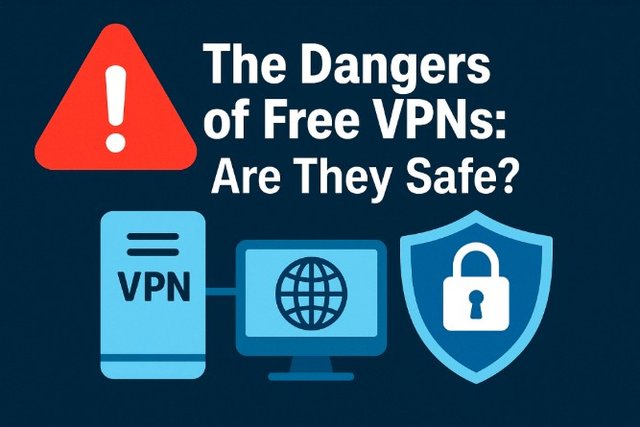The Dangers of Free VPNs: Are They Safe?
Virtual Private Networks (VPNs) have become an essential tool for many people seeking more privacy, security, or access to geo-restricted content. They encrypt your connection, hide your IP address, and can protect your data from surveillance, hackers, or your internet service provider (ISP). But not all VPNs are made equal—free VPNs in particular can come with serious risks. This article explores what those dangers are, whether free VPNs are truly “safe,” and what safer alternatives you might consider. (Source: EC-Council University)
Click to more information about ECCU Blog https://www.eccu.edu/blog/5-reasons-why-you-should-not-use-free-vpns/
Why People Use VPNs
Before digging into the dangers, it helps to understand what motivates their use:
-
Online Privacy: to avoid ISPs, advertisers, or government tracking your browsing history or data.
-
Security: especially when using public Wi-Fi, to protect against hacking, phishing, or malware.
-
Accessing Geo-Restricted Content: using servers in other locations to view streaming content or websites blocked in your country.
-
Remote Work / Secure Access: business or educational institutions may require VPNs so employees or students can safely access internal networks.
While these are legitimate uses, free VPNs often cut corners—and that’s where the dangers arise.
The Risks of Free VPNs
According to EC-Council University, here are several key reasons to avoid free VPNs, or at least to be highly cautious when using them.
-
Security Weaknesses
Free VPN providers may lack the resources to implement strong encryption or secure protocols. This can leave users exposed to malware, hacking, or other threats. -
Data Logging and Privacy Violations
Unlike reputable paid services, many free VPNs log user behavior and sell that data to advertisers or third parties. What you thought was private may actually be being monetized. -
Slower Internet Speeds & Bandwidth Limitations
Free VPNs often limit data usage and throttle speed to reduce cost. When many users share the same limited servers, congestion causes lag, slow loading, buffering, or disconnects. -
Limited Server Locations
Fewer server options mean fewer choices for bypassing censorship or geo-blocks, and often worse performance due to distance or overload. -
Lack of Customer Support
If something goes wrong—connection drops, leaks, app bugs—you may be on your own. Free VPN providers generally offer no or very minimal technical help.
Real-World Implications
These risks are not just theoretical. Some free VPN apps have been found to:
-
Contain malware or adware that itself compromises device security.
-
Leak DNS or IP traffic, undoing much of the “privacy” benefit.
-
Mislead users about what data is collected.
In some cases, they may be sunken costs: the free service is a “loss leader” while monetization comes via data, ads, or tracking.
When Might a Free VPN Be “Okay”?
There are limited cases where a free VPN might be tolerable:
-
For casual, low-risk usage (e.g. checking the weather, light web browsing) where speed, location, or privacy is not critical.
-
As a trial: many paid VPNs offer free plans or money-back guarantees so you can test the service before committing.
-
If you accept the trade-offs (slow speeds, limited servers, possible logging) and take extra precautions (only using trusted providers, not transferring sensitive data, using additional tools like antivirus).
However, these situations are more the exception than the rule.
Safer Alternatives & Best Practices
To protect yourself, consider following these guidelines:
-
Choose a well-known paid VPN provider with a clear privacy policy, audited security, and no-logging guarantee.
-
Check for independent audits or transparency reports to ensure the provider is trustworthy.
-
Use features like kill-switches, DNS leak protection, and strong encryption (AES-256 etc.).
-
Keep your VPN software & operating system updated so that known vulnerabilities are patched.
-
Be cautious using free VPNs on public Wi-Fi or for transmitting sensitive personal data.
Conclusion
Free VPNs may seem appealing because “free” is always attractive. But—as the EC-Council University article reminds us—the costs are often hidden. Risks include weak security, data logging and privacy violations, slow speeds, restricted servers, and lack of support. If your online privacy or security matters even a little, investing in a reputable paid VPN, or at least carefully vetting any free provider, is usually the safer choice. “Free” isn’t always safe.
